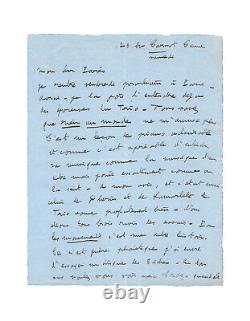
- Homepage
- Author
- Alfred Bruneau (3)
- Anatole France (3)
- Auguste Maquet (3)
- Beydts (louis) (4)
- Camille Mauclair (3)
- Charles Monselet (3)
- Chateaubriand (5)
- Ernest Daudet (3)
- Henri Barbusse (3)
- Jean Couty (3)
- Jean-léon Gérôme (5)
- Louise Read (4)
- Marcel Proust (5)
- Paul Chabas (4)
- Paul Meurice (3)
- Proust (3)
- Roger Martin Du Gard (4)
- Salomon Reinach (3)
- Sully Prudhomme (7)
- Violette Leduc (4)
- Other (3995)
- Binding
- Era
- 18th Century (11)
- 1900 To 1960 (60)
- 1930s (4)
- 1960s (5)
- 1970s (7)
- 19th (5)
- 19th Century (48)
- 20th Century (15)
- Beautiful Era (12)
- Belle Epoque (49)
- First Empire (8)
- Nineteenth (19)
- Nineteenth Century (11)
- Post-war (21)
- Restoration (17)
- Revolution (4)
- Roaring Twenties (28)
- Second Empire (21)
- Second World War (5)
- World War Ii (9)
- Other (3711)
- Language
- Theme
- Type
Francis POULENC / Signed Autograph Letter / The Biches / The Bestiary / Trio



Autographed letter signed "Francis Poulenc" to composer Philippe Parès, Cannes, late March 1928? 1/2 in-4° on sky blue paper, in black ink. Creasing marks inherent to the original sending. We have restored the punctuation for easier reading. A beautiful unpublished letter from Poulenc regarding the recording of his Trio for oboe, bassoon, and piano, and the Bestiaire. I am returning to Paris next Friday. Will I have the joy of hearing the proofs of the trio already? You know nothing in the world amuses me more.
It is a remarkable piano lesson and how pleasant it is to hear one's own music as if it were the music of another, but played exactly as one feels it. In my opinion, that was also the view of Dhérin and Lamorlette. The trio sounds perfectly well. We were all three delighted with the trials. As for the movements, that’s another story.
It’s hardly phonetic; I want to try a recording of the Biches [ballet composed by Poulenc in 1924 and created by Diaghilev on January 6, 1924]. In any case, could you see with Croiza [sic] when she wants to record the Bestiaire? Anyway, as soon as I land, I will call you.
We will also seriously discuss the contract issue. A thousand friendly regards in haste to you and your lovely collaborator." This letter could certainly date from the year 1928, during which the three musicians made the recording. Composed in 1926 by Poulenc, he is accompanied at the piano by Gustave Dhérin, bassoonist, and Roland Lamorlette, oboist.
Poulenc composed this chamber music in homage to Manuel de Falla, who, in return, particularly appreciated it. The Trio for oboe, bassoon, and piano is also considered by some to be the first significant work in the composer’s chamber music repertoire, reflecting Poulenc's personality intensely. The recording of the Bestiaire or Cortège d'Orphée, mentioned later in the letter, would not take place until much later, as the project had to be postponed. Poulenc composed this cycle of melodies in 1918, drawing from the eponymous work by Guillaume Apollinaire. We thank Nicolas Southon for confirming the unpublished nature of this letter and for the information he kindly shared with us.

